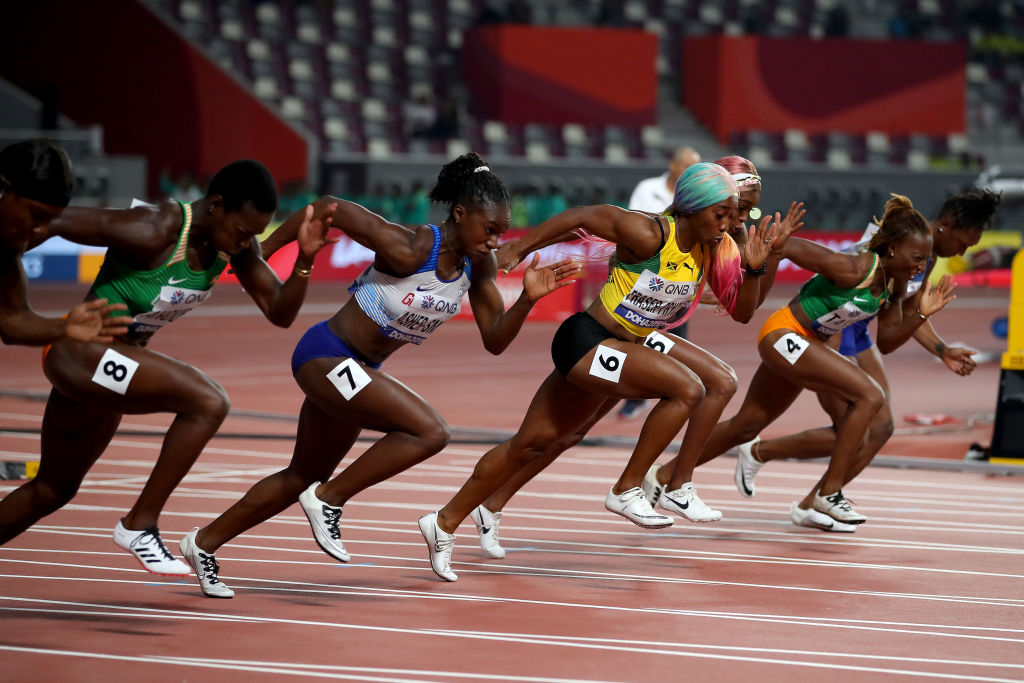The Women's 100m Final is one of the most electrifying events in athletics, showcasing the speed and agility of the world's best female sprinters. This race not only captures the essence of athletic prowess but also serves as a platform for breaking records and setting new standards in the world of sports. In this article, we will delve deep into the Women's 100m Final, exploring its history, key athletes, records, and much more.
In recent years, the Women's 100m Final has gained significant attention, particularly during major international competitions such as the Olympics and World Championships. The excitement surrounding these events stems from not only the high stakes of competition but also the inspirational stories of the athletes competing. This article aims to provide readers with a thorough understanding of the Women's 100m Final, highlighting its importance in the sporting world.
As we journey through this guide, we will examine various aspects of the Women's 100m Final, including its historical context, the profiles of elite athletes, and the significance of this event in promoting gender equality in sports. Whether you are a seasoned athletics fan or new to the sport, this article will equip you with valuable insights into the thrilling world of women's sprinting.
Read also:Josh Groban The Journey Of A Multifaceted Artist And His Musical Impact
Table of Contents
- History of Women's 100m Final
- Key Athletes in Women's 100m Final
- Records in Women's 100m Final
- Recent Women's 100m Finals
- Training Techniques of Elite Sprinters
- Impact of Women's 100m Final on Sports
- The Future of Women's 100m Final
- Conclusion
History of Women's 100m Final
The Women’s 100m Final has a rich history that dates back to the early 20th century. The event was first introduced to the Olympic Games in 1928 in Amsterdam, marking a significant milestone in women's athletics. Since then, the Women's 100m Final has evolved, showcasing remarkable talent and competitiveness.
The Evolution of Women's Sprinting
Over the decades, women's sprinting has witnessed numerous transformations, both in terms of performance and recognition. The early years saw women facing challenges related to societal norms and expectations. However, as women's participation in sports increased, so did the recognition of their achievements.
Milestones in Women's 100m History
- 1928: First Olympic Women's 100m Final held in Amsterdam.
- 1960: Wilma Rudolph becomes the first American woman to win three gold medals in one Olympics.
- 1988: Florence Griffith-Joyner sets the world record of 10.49 seconds at the U.S. Olympic Trials.
- 2008: Shelly-Ann Fraser-Pryce wins gold at the Beijing Olympics, marking the rise of a new sprinting star.
Key Athletes in Women's 100m Final
The Women's 100m Final has been graced by numerous iconic athletes who have left an indelible mark on the sport. Here are some of the key figures:
Florence Griffith-Joyner
Known for her incredible speed and distinctive style, Griffith-Joyner set the world record in 1988, a record that still stands today.
Shelly-Ann Fraser-Pryce
With multiple Olympic and World Championship titles, Fraser-Pryce has established herself as one of the greatest female sprinters of all time.
Elaine Thompson-Herah
A reigning Olympic champion, Thompson-Herah has proven her mettle on the track, consistently delivering outstanding performances.
Read also:Lena The Plug Jason Exclusive Content News
Records in Women's 100m Final
The Women's 100m Final has seen numerous records being shattered over the years. Here are some of the most notable records:
World Record
The current world record for the Women's 100m is 10.49 seconds, set by Florence Griffith-Joyner in 1988.
Olympic Record
The Olympic record is held by Elaine Thompson-Herah, who clocked 10.61 seconds during the Tokyo Olympics in 2021.
Continental Records
- African Record: 10.78 seconds by Blessing Okagbare.
- European Record: 10.75 seconds by Dafne Schippers.
Recent Women's 100m Finals
In recent years, the Women's 100m Final has continued to captivate audiences worldwide. Key events include:
Tokyo 2021 Olympics
The Tokyo Olympics showcased an exhilarating Women's 100m Final, where Elaine Thompson-Herah defended her title and set a new Olympic record.
World Championships 2022
The 2022 World Championships featured fierce competition, with emerging talents challenging established stars, contributing to the event's rich history.
Training Techniques of Elite Sprinters
To excel in the Women's 100m Final, athletes employ a range of training techniques aimed at enhancing their speed and performance:
Strength and Conditioning
- Weight training to build muscle strength.
- Plyometrics for explosive power.
Speed Work
- Interval training to improve sprinting speed.
- Acceleration drills to enhance starting speed.
Impact of Women's 100m Final on Sports
The Women's 100m Final plays a crucial role in promoting gender equality in sports and inspiring future generations of athletes. Its visibility helps to challenge stereotypes and encourages more women to participate in athletics.
Role Models for Young Athletes
Successful female sprinters serve as role models, demonstrating that women can excel in competitive sports. Their achievements inspire young girls to pursue athletics and break down barriers.
The Future of Women's 100m Final
As we look ahead, the Women's 100m Final is poised for further growth and development. With the emergence of new talents and advancements in training methodologies, the future of this event is bright.
Anticipation for Upcoming Events
Fans eagerly await future competitions, including the next Olympic Games and World Championships, where new records may be set, and fresh faces may rise to prominence.
Conclusion
In summary, the Women's 100m Final is a showcase of speed, talent, and determination. From its historical roots to its current status as a premier event in athletics, it continues to inspire athletes and fans alike. We encourage you to share your thoughts on this thrilling event in the comments below and explore more articles on our site!
Thank you for joining us on this journey through the Women's 100m Final. We look forward to seeing you again for more insights and updates on the world of athletics.
Article Recommendations


